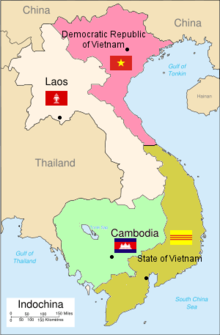International Control Commission
The International Control Commission (German: Internationale Kontrollkommission , ICC or ICSC for short ) was a military observer and peacekeeping mission of the powers Poland , India and Canada in Southeast Asia . Deployed in Vietnam , Laos and Cambodia , it was to review the outcome of the Indochina Conference and monitor compliance with the Geneva Agreement of July 21, 1954.
The commission ceased its work at the beginning of 1973 and was replaced by the International Commission of Control and Supervision ICCS for short . By and large, the mission is considered a failure. So she could not prevent the Vietnam War or the civil wars in Laos and Cambodia.
The three countries were deliberately chosen: Poland as a member of the Eastern Bloc , Canada as a member of NATO and India as a non-aligned state . The ICC never had sufficient resources to carry out the tasks set. With the Treaty on the Neutrality of Laos ( English : International Agreement on the Neutrality of Laos ) signed on July 23, 1962 in Geneva , the ICC received additional tasks. It was supposed to oversee the withdrawal of foreign troops in the Kingdom of Laos. The ICC did not succeed in this either. The United States withdrew its troops and military advisers from Laos in accordance with the treaty. However, they continued to intervene in the civil war by bombing Laos from Thailand . The Central Intelligence Agency (CIA) also took over operations in Laos and set up secret bases for them, and trained Hmong fighters. North Vietnam continued to use the Laos area to supply its troops in South Vietnam's Ho Chi Minh Trail and intervened decisively in the north-east of the country in the civil war by supporting the Pathet Lao armed forces. At times there were several North Vietnamese divisions in the country. The ICC was unable to adequately document these operations because there was a lack of funds to carry out comprehensive controls in the sparsely populated country. There was also a lack of political will, as neither Poland nor Canada had an interest in the operations of the respective allies being comprehensively documented. The area bombing by the Americans was also not addressed by the ICC. Laos is considered the most bombed country on earth.
Canada participated in the mission with a total of 240 soldiers and 50 civilians from the State Department. Poland took part with a total of around 1,400 soldiers. India provided the chairman and an infantry battalion . The strength varied, but averaged around 1000 men, divided into 14 teams. Headquarters was first in Hanoi , from April 1958 in Saigon . The United States provided equipment and vehicles. The ICC did not have its own aircraft. They chartered planes and helicopters from private providers, e. B. Air America , a private airline of the Pacific Cooperation, is actually a front company of the CIA. North and South Vietnam provided patrol boats for patrols in coastal waters. As a result, unannounced controls were not possible. The inspectors were only allowed to see what the warring parties allowed them to see. The mandate did not permit its own initiatives. Canadian soldiers were believed to be passing information to the American armed forces . India was considered pro-Soviet, Poland was considered a war party. The South Vietnamese government did not recognize the ICC but forwarded its complaints to France . The ICC rejected this.
Web links
- Vivienne Brosnan: The International Control Commission for Vietnam; the diplomatic and military context [1]
- International Commission of Control and Supervision [2]
Individual evidence
- ↑ Major General George S. Eckhardt Vietnam Studies - Command and Control 1950–1969
- ^ Richard A. Falk The Vietnam War and International Law, Volume 1 Princeton Legacy Library, page 286
- ↑ DR Sardesai Indian Foreign Policy in Cambodia, Laos, and Vietnam, 1947-1964
- ↑ Lawrence Freedmann Kennedy's Wars: Berlin, Cuba, Laos, and Vietnam, 2000 Oxford University Press, page 293
- ^ Richard A. Falk The Vietnam War and International Law, Volume 1 Princeton Legacy Library, page 187
- ^ Robert D. Sander: Invasion of Laos, 1971: Lam Son 719 University of Oklahoma Press
- ↑ How the US Secret War in Laos Is Still Happening Today. From 1964 to 1973, the United States bombed Laos more heavily than any country on earth.
- ↑ International Commission of Control and Supervision
- ^ India's Peacekeeping Missions
- ↑ a b International Commission for Supervision and Control - Vietnam (ICSC - Vietnam)

